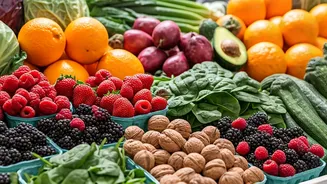Embrace Healthy Fats
Not all fats are created equal; some can significantly impact cholesterol levels. Saturated and trans fats tend to elevate LDL cholesterol, the type that
poses cardiovascular risks. Conversely, unsaturated fats, especially those found in olive oil, sunflower oil, nuts, seeds, and avocados, can aid in increasing HDL levels, thereby supporting overall heart health. To implement these changes, it's beneficial to substitute traditional cooking fats like butter and ghee with healthier alternatives such as olive or mustard oil. Furthermore, consider cooking methods like steaming, grilling, or air-frying instead of deep-frying, which can reduce the intake of unhealthy fats. Opting for spreads made from avocados or nuts over mayonnaise or butter can also make a positive impact. Even small dietary shifts can contribute to measurable improvements in cholesterol profiles over time.
Snack Smart Choices
Nuts and seeds are excellent choices for managing cholesterol because they are rich in plant sterols and omega-3 fatty acids, both of which have been scientifically shown to reduce LDL cholesterol naturally. In addition to reducing LDL, these nutrient-dense foods can help improve HDL levels, fostering better heart health. To get the most from these foods, consider incorporating a small handful of almonds, walnuts, or pistachios into your daily diet. You can also add seeds like pumpkin and sunflower to your salads or breakfast cereal. Pairing nuts with fruits makes for a satisfying snack, and that also helps keep blood sugar levels steady. However, it's important to be mindful of portion control since nuts are calorie-dense. Overconsumption can lead to weight gain, which is a known risk factor for high cholesterol. This balanced approach ensures you reap the benefits of these foods without adverse effects.
Fruits and Veggies
Adding a variety of fruits and vegetables to your diet is a simple yet effective strategy for managing cholesterol. These foods are generally low in calories, packed with essential nutrients, and rich in soluble fiber. Soluble fiber is particularly helpful because it can reduce LDL cholesterol levels. Furthermore, fruits and vegetables contain antioxidants that protect your heart from oxidative stress and inflammation, contributing to overall cardiovascular well-being. Some effective choices for cholesterol management include fruits like apples, oranges, grapes, and berries, which contain high levels of pectin. Vegetables like spinach, carrots, okra, and broccoli are also very beneficial for supporting heart health. To integrate more fruits and vegetables into your meals, aim to fill half your plate with vegetables at every meal. Include a piece of fruit with breakfast, lunch, or dessert. If eating raw vegetables is difficult, try incorporating them into soups or smoothies. A diet rich in colorful produce not only lowers bad cholesterol but also boosts overall immunity and vitality.
Stay Active Daily
Regular physical activity is one of the most effective ways to manage cholesterol naturally. Exercise helps raise HDL cholesterol while lowering LDL, leading to improved circulation and overall heart health. You don't need a gym membership to stay active; there are many ways to incorporate exercise into your daily routine at home. For example, consider taking brisk walks around your home or neighborhood for 20–30 minutes daily. You can also engage in simple home workouts such as yoga, skipping, or stair climbing. Even household chores like gardening, sweeping, or mopping count as physical activity. Consistency is key, and even moderate daily movement can significantly improve cholesterol levels over time. Making physical activity a regular part of your life enhances your body's natural processes for cholesterol management, leading to improved cardiovascular well-being.
Lifestyle Habits
Beyond diet and exercise, certain lifestyle habits can significantly influence cholesterol levels. Quitting smoking is crucial because smoking lowers HDL cholesterol and damages blood vessels. Limiting alcohol intake is also important, as excessive alcohol consumption can raise triglycerides and negatively affect liver function. Managing stress is essential, because chronic stress can adversely affect heart health and cholesterol levels. Finally, maintaining a healthy weight is vital; excess weight often increases LDL and decreases HDL levels. Implementing these lifestyle changes in conjunction with dietary and exercise adjustments provides a holistic approach to managing cholesterol levels. These combined strategies create a comprehensive plan that supports overall health and well-being, greatly enhancing your chances of maintaining a healthy heart.




















